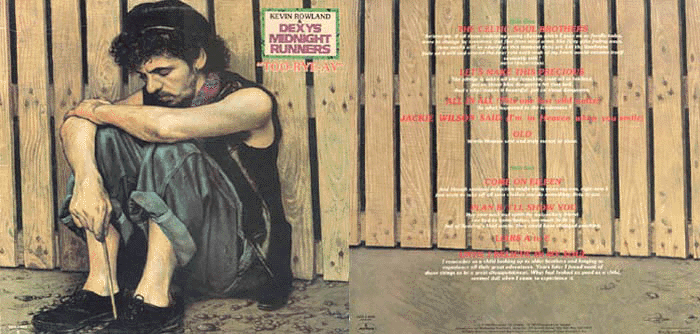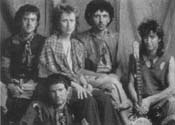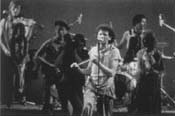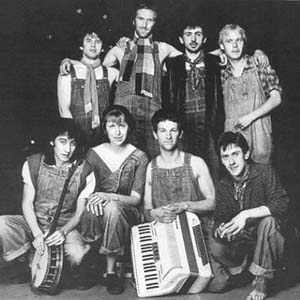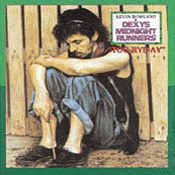
|
Too-Rye-Ay Mercury, July 1982 LP (SRM-1-4069) CD (514839-2) Side A:
Side B:
Remaster released in 1996 includes bonus tracks: You can't help suspecting that when Kevin Rowland put out th album, Too-Rye-Ay in 1982, he probably wanted to change the name of the band from Dexys Midnight Runners to The Celtic Soul Brothers. And why shouldn't he have? Over the previous year he'd changed just about everything else about them, from the entire line up and their sound to the very clothes that they all wore. "I'm a wanderer," Kevin Rowland would often say in interviews. "I move on from one thing to another. They only seem extreme because you don't see the joins. You might only see me every two years. One thing leads in to another. I don't think it's a matter of being flighty or changing interests. It's a matter of developing." Born in Wolverhampton in 1953 to Irish parents, Rowland spent his childhood moving between the Midlands, Ireland and North London. This partly explains Too-Rye Ay's strange marriage of Northern Soul and traditional Irish music, that he christened Celtic Soul. But Too-Rye-Ay would prove to be Rowland's most accessible and most unashamedly pop album, spending forty six weeks on the UK charts and spawning the transatlantic number one single Come on Eileen. After cutting his first record with the short lived punk band The Killjoys, Kevin Rowland formed Dexys Midnight Runners in 1978. Though their name was inspired by the drug, Dexedrine (the amphetamine compound favoured by Northern Soul fans to keep them going through their all night dancing sessions,) they had taken a notoriously puritanical attitude to both drink and drugs. Nothing was to come between any member's dedication to the band. And being in a band like Dexys was very hard work. "Dexys is my life, my work. It means everything to me. I put all I can into it," Rowland would say. He expected the same high level of commitment from his musicians. Fittingly the band's image at the time of their debut album, 1980's Searching fro the Young Soul Rebels, comprised of New York docker wear inspired by the Martin Scorsese movie Mean Streets. The single Geno, a brilliant example of their brass driven, enraged sound - Sixties R&B with an Eighties New Wave sensibility - hit number one in May 1980. But soon after the first incarnation of Dexys Midnight Runners fell apart. All of the band deserted Rowland, bar his long time associate, trombone player Big Jimmy Paterson. The pair recruited drummer Seb Shelton, guitarist and banjo player Billy Adams, the keyboard player Mickey Billingham, bassist Giorgio Kilkenny and the sax players Brian Maurice and Paul Speare. After a brief transitional period (which saw the release of very different versions of Liars A to E and I'll Show You as singles) the band left EMI for Mercury Records. Then in Early 1982 two fiddle player, Helen O'Hara and Steve Brennan - The Emerald Express - were added to the line up. As was always the case with Dexys Midnight Runners their new era was announced with a new look, a kind of modern gypsy chic. The band all now wore dungarees and neckerchiefs, berets and black plimmies (or even better bare feet,) leather waistcoats and scuffy hair and, for the boys, stubble. The music was every bit as much of a radical departure. Horns, fiddles, banjos and tin whistles had never been staples of the wonderful world of pop. And, though it would eventually become a very popular formula, the sheer shock of the new probably caused the first single from Too-Rye-Ay, The Celtic Soul Brothers, to stall at number forty five. A disappointed Rowland decided to pull out all the stops. He reversed his "no press interviews" policy and began touring the new band extensively in an acclaimed live show called The Bridge (from which the live tracks, including the astonishing seven minute version of Come on Eileen, are taken.) These tactics paid off well, and in the Summer of 1982 Come on Eileen became Dexys Midnight Runners second British number one single. Seven months later it reached pole position in the States as well. As ebullient as any pop record could ever hope to be, Come on Eileen describes that unbearably thin line between love and lust, and makes a connection between the emotive power of popular music in the past ("poor old Johnnie Ray. . . he moved a million hearts in mono") and Rowland's current ambitions. As so often happens when songs get as popular as this one did, it soon took on a new life, becoming a ubiquitous party anthem as infectious / irritating (delete as you feel applicable) as "Hi Ho Silver Lining" or "Brown Sugar." We "hum this song forever" Kevin Rowland wrote somewhat prophetically in its lyrics. With its hypnotic bass line, surging horns and strings, sing-a-long chorus and that great, great voice, Come on Eileen proved a suitable taster for the forthcoming long player. The seductive possibilities of sound itself had become an obsession of Kevin Rowland's. Whereas earlier he would proudly proclaim his Irish roots with a polemical lyric like "Burn it down," here he does so by allowing the music to speak for itself. Similarily he also frequently chooses to dispense with words all together on this album. Preferring to signify passion, pleasure and pain by using a series of gasps and cries and whispers. (Little parlour game: Try to figure out the words to Let's Make This Precious without looking at the lyric sheet.) But then, who when they hear Rowland declaiming "go toora loora loo-rya-ay," has to ask themselves what he means? Always moving, moving moving, Come on Eileen was credited to Dexys Midnight Runners and The Emerald Express. By the time of this album's release in July, Jim Paterson had left and the group was now working under the moniker of Kevin Rowland and Dexys Midnight Runners. The songs on Too-Rye-Ay all fit together as if it were a recording of a live show. From Keving introducing The Celtic Soul Brothers to a smattering of overdubbed applause, up until the final rousing "encore" of Come on Eileen (Admittedly this wasn't that original a trick - a band called The Beatles used it on Sgt. Pepper back in the Sixties.) Its first four songs are a statement of intent, soulful and stirring invitations to the dance. Jackie Wilson Said (I'm in Heaven When You Smile) had been a single for that pioneering Celtic soulster, Van Morrison, ten years earlier. It went top five for Dexys that Autumn. Plan B was yet another of those appropriately exhilirating Rowland homages to the power of soul songs and singers (and to Bill Withers "Lean on Me" in particular.) He tipped his hat to his influences once more on the songs he covered on two b-sides of the time included here, the Philly anthem T.S.O.P. and Aretha Franklin's Respect. I'll Show You had first been aired in a very different form as Dexys last EMI single Show Me, an almost homoerotic look back on the lads he'd known at school. Originally it was a fast and furious blast of hate asking where the kings of the playground had ended up. But this version is far less vitrolic, and is sympathetic, rather than scornful, to the fact that so many of those roaring boys have now ended up as broken men. This time round Kevin Rowland was saving his real vitriol for another group of people. Liars A to E is a blistering attack on his critics. "Just observers," Rowland would call them, "as opposed to do-ers like myself." Rowland's "difficult" persona and all his talk of soul, spirit and passion, then deemed unfashionable by a new school of music journalists who'd overdosed on the works of Roland Barthes, had won him several enemies on the music press. Though conversely there can be few figures in modern music who have been called a "genius" by that self same group of people quite as frequently as Kevin Rowland has been. One listen to Too-Rye-Ay is enough to remind anyone why. "I take deadly serious what I do, " he told one interviewer. "It's very important to me to be an individual. I don't care if people laugh. That's what Dexys Midnight Runners is all about. Showing your feelings and not giving a damn what other people think. people will always laugh at Dexys. That's fine. But I know that what I'm doing is totally honest. I believe in myself. I will pin up my soul on the wall and let people read it. They can laugh, they can cry. It's up to them. I really don't mind." The beautifully executed Until I Believe in My Soul, is the most perfect realisation of that noble intention. Who after hearing that frankly orgasmic series of grunts and this most superbly orchestrated piece of pop wouldn't believe in Rowland's soul? Here was music that was every bit as inspirational and emotional as the songs that haunted Kevin Rowland in his youth. Mission accomplished, perhaps inevitably the great man moved on once more. Though he never regained the commercial success he'd enjoyed with Too-Rye-Ay, the next Dexys Midnight Runners album, 1985's Don't Stand Me Down, is now widely regarded by critics as one of the greatest "lost" records of all time. After another disappearance came his first solo album, The Wanderer in 1988, a mighty fine and massively under rated collection of simply executed songs. Then the wandered off into the wilderness once more. Nothing has been committed to vinyl by Kevin Rowland in almost eight years. Too-Rye-Ay is the sound of both a man and a band at the height of their powers. I can think of no more appropriate words to end this piece with than the very same ones with which Kevin Rowland starts off this album: "More please. . .and thank you." Richard Smith |
